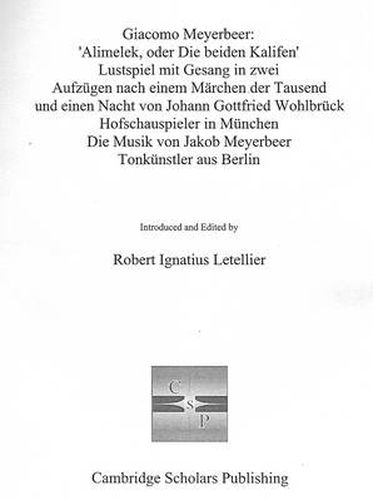Giacomo Meyerbeer: 'Alimelek, oder Die beiden Kalifen
Robert Ignatius Letellier

Giacomo Meyerbeer: ‘Alimelek, oder Die beiden Kalifen
Robert Ignatius Letellier
The subject-matter of Meyerbeer’s second opera Wirt und Gast, or Aus Scherz Ernst (also called Alimelek), written in Munich in 1812, was taken from a tale in The Arabian Nights. The story of the man who would be sovereign, if only for one day, so frequently treated in the literature of all nations. The opera is an example of the Oriental or Turkish operas which were so popular in Germany during the second third of the eighteenth century.
The orchestra includes, besides the strings, doubled wood-wind, and threefold percussion, only two horns, two trumpets, and one trombone. While Meyerbeer’s contemporaries were puzzled by the far-fetched singularity of the Alimelik music, and the work had no success in Stuttgart and Vienna (6 January 1813; 20 October 1814), Weber had the insight to recognize its true significance. He produced it
Prague on 20 October 1815, and praised the active, alert imagination, the well-nigh voluptuous melody, the correct declamation, the entire musical attitude. He was also impressed by the instrumentation: It is surprisingly combined, interwoven with great delicacy, and consequently demands almost the care of a quartet performance. Weber’s enduring admiration meant that he again produced the work in Dresden years later (1820), when he pointed out how this early opera
bears witness to the composer’s singular emotional capacity. This facsimile edition contains the composer’s entire conception of the work, restoring material cut from the first performance. Meyerbeer shows astonishing maturity for a composer of twenty-one. Not only the psychic state of the leading characters, but also the conflict of the entire plot, is presented in concentrated style by the aid of recurrent themes. The specifically romantico-psychological modification of the leading-motive is met with here for the first time, i.e., two years before Wagner’s birth (Edgar Istel).
This item is not currently in-stock. It can be ordered online and is expected to ship in approx 4 weeks
Our stock data is updated periodically, and availability may change throughout the day for in-demand items. Please call the relevant shop for the most current stock information. Prices are subject to change without notice.
Sign in or become a Readings Member to add this title to a wishlist.


